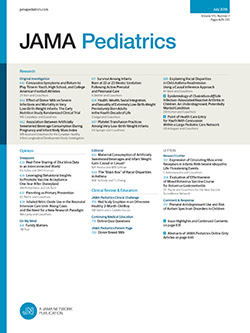现金转移及其对孕产妇和幼儿健康的影响:一项随机临床试验
IF 18
1区 医学
Q1 PEDIATRICS
引用次数: 0
摘要
重要性低收入家庭的父母和孩子比高收入家庭的孩子更有可能经历更糟糕的身心健康。目的探讨4年每月无条件现金补助对低收入母亲心理健康和母婴身体健康的影响。设计、环境和参与者这是一项平行组随机临床试验,于2018年5月至2023年7月进行。从4个城市的12家医院的产后病房招募母婴二人组(2018年5月- 2019年6月):内布拉斯加州奥马哈;明尼阿波利斯/圣保罗,明尼苏达州;路易斯安那州的新奥尔良;还有纽约,纽约。数据分析时间为2023年9月至2025年2月。干预措施母亲们被随机分配,要么用借记卡收到高现金礼物(每月333美元),要么收到低现金礼物(每月20美元)。在他们的孩子生命的前6年里,现金礼物一直在继续。这里分析的数据是在4年的月度转移后收集的。主要结果和测量结果在儿童四岁生日前后进行预登记和测量。产妇结局包括抑郁、焦虑和身体质量指数(BMI)。儿童结局包括年龄和性别调整后的BMI百分位数和母亲报告的儿童健康状况(总体健康状况、过去一年患病次数和慢性健康状况)。结果本研究共纳入1000例母婴对,平均[SD]产妇年龄27.0[5.8]岁。在这些母亲中,有400人被随机分配收到333美元的高现金礼物,600人收到20美元的低现金礼物。数据来自891对母子。产妇抑郁症状组间差异无统计学意义(效应量[ES], 0.04;95% CI, -0.08 ~ 0.17;P = 0.51),焦虑(ES, 0.12;95% CI, -0.02 ~ 0.25;P = 0.09)或BMI (ES, -0.06;95% CI, -0.21 ~ 0.09;p = .42)。此外,儿童BMI百分位数组间差异无统计学意义(ES, -0.03;95% CI, -0.17 ~ 0.12;P = 0.73)或整体儿童健康(ES, 0.08;95% CI, -0.07 ~ 0.22;p = .30)。结论和相关性:在4年时间里,每月向低收入母亲无条件转移约1.5万 000美元的现金,并没有改善母亲的心理健康、母亲或儿童的BMI,也没有改善母亲对儿童健康的报告。这些结果可能反映了现金转移支付与健康之间缺乏因果关系,儿童早期收入的影响可能要到以后的生活中才会出现,或者收入增加18%不足以克服与贫困相关的结构性脆弱性,这些脆弱性有助于健康。临床试验注册号:NCT03593356。本文章由计算机程序翻译,如有差异,请以英文原文为准。
Cash Transfers and Their Effect on Maternal and Young Children's Health: A Randomized Clinical Trial.
Importance
Mothers and children in low-income households are more likely to experience worse mental and physical health than those from higher-income households.
Objective
To determine the effect of 4 years of monthly unconditional cash transfers on the mental health of mothers with low-income and the physical health of mothers and children.
Design, Setting, and Participants
This was a parallel-group, randomized clinical trial conducted from May 2018 to July 2023. Mother-infant dyads were recruited (May 2018-June 2019) from postpartum wards in 12 hospitals in 4 cities: Omaha, Nebraska; Minneapolis/St Paul, Minnesota; New Orleans, Louisiana; and New York, New York. Data were analyzed from September 2023 to February 2025.
Interventions
Mothers were randomly assigned to receive either a high-cash gift ($333 per month) or a low-cash gift ($20 per month) on debit cards. The cash gifts continued for the first 6 years of their children's lives. Data analyzed here were collected after 4 years of monthly transfers.
Main Outcomes and Measures
Outcomes were preregistered and measured around the child's fourth birthday. Maternal outcomes included depression, anxiety, and body mass index (BMI). Child outcomes included age- and sex-adjusted BMI percentile and maternal report of child health (overall health, times sick in the past year, and presence of chronic health conditions).
Results
A total of 1000 mother-infant dyads (mean [SD] maternal age, 27.0 [5.8] years) were included in this study. Among those mothers, 400 were randomly assigned to receive the $333 high-cash gift and 600 received the $20 low-cash gift on debit cards. Data were available from 891 mother-child dyads. No statistically detectable group differences were found in maternal depressive symptoms (effect size [ES], 0.04; 95% CI, -0.08 to 0.17; P = .51), anxiety (ES, 0.12; 95% CI, -0.02 to 0.25; P = .09), or BMI (ES, -0.06; 95% CI, -0.21 to 0.09; P = .42). In addition, there were no statistically detectable group differences in child BMI percentile (ES, -0.03; 95% CI, -0.17 to 0.12; P = .73) or overall child health (ES, 0.08; 95% CI, -0.07 to 0.22; P = .30).
Conclusions and Relevance
Monthly unconditional cash transfers totaling approximately $15 000 over 4 years to mothers with low incomes did not improve maternal mental health, maternal or child BMI, or maternal report of children's health. These results could reflect the absence of causal connections between cash transfers and health, the possibility that impacts of early childhood income may not appear until later in life, or that an 18% increase in income is insufficient to overcome the structural vulnerabilities associated with poverty that contribute to health.
Trial Registration
ClinicalTrials.gov Identifier: NCT03593356.
求助全文
通过发布文献求助,成功后即可免费获取论文全文。
去求助
来源期刊

JAMA Pediatrics
PEDIATRICS-
CiteScore
31.60
自引率
1.90%
发文量
357
期刊介绍:
JAMA Pediatrics, the oldest continuously published pediatric journal in the US since 1911, is an international peer-reviewed publication and a part of the JAMA Network. Published weekly online and in 12 issues annually, it garners over 8.4 million article views and downloads yearly. All research articles become freely accessible online after 12 months without any author fees, and through the WHO's HINARI program, the online version is accessible to institutions in developing countries.
With a focus on advancing the health of infants, children, and adolescents, JAMA Pediatrics serves as a platform for discussing crucial issues and policies in child and adolescent health care. Leveraging the latest technology, it ensures timely access to information for its readers worldwide.
 求助内容:
求助内容: 应助结果提醒方式:
应助结果提醒方式:


